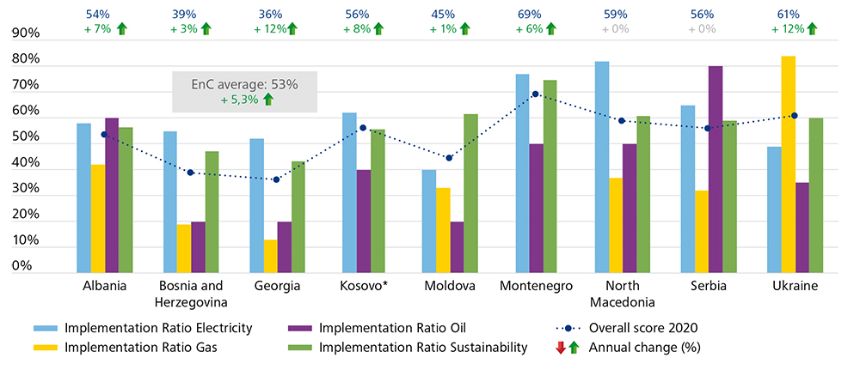Annual Implementation Report 2020: Energy reforms move ahead despite Covid-19
The Energy Community Secretariat’s Annual Implementation Report, released today, reveals that the Energy Community Contracting Parties have made progress in market-oriented and sustainable energy reforms despite the Covid-19 crisis. The average implementation score increased from 48% to 53%. While Montenegro still remains the front-runner, Ukraine jumped ahead of North Macedonia and Serbia, where progress has plateaued, to claim second place. In the middle of the ranking, Kosovo* and Albania have both made progress, while reform in Moldova was modest. At the bottom of the ranking are Bosnia and Herzegovina, the country with the most infringement cases, and Georgia, the newest member of the Energy Community, which despite its low ranking was one of the biggest movers during this reporting period.
Director Janez Kopač said: “While there is no doubt that more needs to be done in the areas of emissions abatement, energy efficiency, sustainable renewables and genuine market integration if the Energy Community is to succeed in the clean energy transition, I see the glass as half full. In spite of this year’s challenging conditions, several Contracting Parties managed to leap forward. This goes in particular for Ukraine, which had successfully unbundled Europe's largest gas transmission system at the end of 2019, and Georgia, which adopted key energy efficiency laws, an overarching energy law and secondary legislation for the power sector”.
The Director also highlighted progress in the area of climate, where the Energy Community does not have a hard legal framework yet, “Montenegro must be commended for being the first Contracting Party to introduce an Emissions Trading Scheme, while Moldova was the fourth country in the world to submit its second Nationally Determined Contribution under the Paris Agreement to the UNFCCC. North Macedonia led the way in the preparation of the integrated National Energy and Climate Plans, followed by Albania, Bosnia and Herzegovina and Georgia.”
Overall, the Energy Community is on track to meet its 2020 energy efficiency target and financing for energy efficiency, especially in buildings renovation, has increased despite Covid-19. Renewable energy is another area where the report confirms genuine progress, showing a 19% increase in renewables capacities in the whole of the Energy Community during the reporting period, predominantly in solar and onshore wind. “Unfortunately, this progress comes too late in some cases, and North Macedonia, Serbia and Ukraine are almost certain to miss their 2020 targets,” explained Deputy Director Dirk Buschle. “Auctions for renewables in Albania and North Macedonia achieved prices that are much lower than the previous administratively set feed in tariffs, decreasing support costs charged to final consumers. This should be a motivation for all Contracting Parties to move to market-based support schemes,” he added.
“Our experience shows that renewable projects can have significant impacts and serious efforts are needed to ensure proper implementation and enforcement of environmental impact legislation, especially when it comes to small hydro power projects,” explained Deputy Director Buschle. Only Montenegro and Georgia revised their legislation in line with the amending Environmental Impact Assessment (EIA) Directive 2014/52/EU, which introduces better quality control of EIA reports and decisions and legally binding timeframes and penalties, by the 1 January 2019 deadline.
As in 2019, the report underscores that all Contracting Parties which have coal in their energy mix are struggling to comply with the emission ceilings established under their National Emission Reduction Plans (NERPs) for at least one of the three pollutants (nitrogen oxides, sulphur dioxide and dust) covered by the Large Combustion Plants Directive. “This is a worrying trend as the ceilings get more and more stringent as time goes on. It is alarming that Kosovo* failed to comply with the ceilings for all three for the second year in a row, while Bosnia and Herzegovina and North Macedonia once again failed to reach the ceilings for sulphur dioxide and dust and Serbia for sulphur dioxide,” noted Buschle. Several plants that are under limited lifetime derogation (opt-out) are rapidly getting close to the end of their remaining operational lifetime, with the first (TPP Pljevlja in Montenegro) expected to reach the limit by the end of 2020.
The 2020 report covers electricity, gas, energy regulators, oil, renewable energy, energy efficiency, environment, climate, infrastructure, competition, statistics and for the first time cyber security. The full report, as well as the executive report and country reports as separate files, can now be downloaded on the Energy Community website.
* This designation is without prejudice to positions on status, and is in line with UNSCR 1244 and the ICJ Opinion on the Kosovo declaration of independence.


